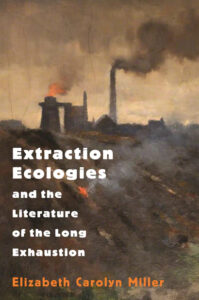By Elizabeth Carolyn Miller. Princeton University Press, 2021.

In “Extraction Ecologies and the Literature of the Long Exhaustion,” Elizabeth Carolyn Miller (UC Davis) explores the British literary landscape from the 1830s to the 1930s—an era characterized by the rise of industrial mining throughout the imperial world—to show how literature during this period engaged with the looming threat of resource exhaustion, weaving it into the narrative fabric.
Miller skillfully examines canonical works such as “Hard Times,” “The Mill on the Floss,” and “Sons and Lovers,” showing how the provincial realist novel’s reliance on marriage and inheritance plots adapts in the face of exhaustion, deferring the promise of reproductive futurity. Adventure stories like “Treasure Island” and “Heart of Darkness” similarly reorient fictional space toward the resource frontier, while utopian and fantasy works like “Sultana’s Dream,” “The Time Machine,” and “The Hobbit” envision alternative energy futures beyond extractivism.
The author’s thorough investigation into how an era marked by resource extraction inspired new literary forms and genres is both innovative and thought-provoking. “Extraction Ecologies and the Literature of the Long Exhaustion” has earned the Stansky Book Prize from the North American Conference on British Studies, an Honorable Mention for the Ecocriticism Book Award from the Association for the Study of Literature and Environment, and a Choice Outstanding Academic Title of the Year.
